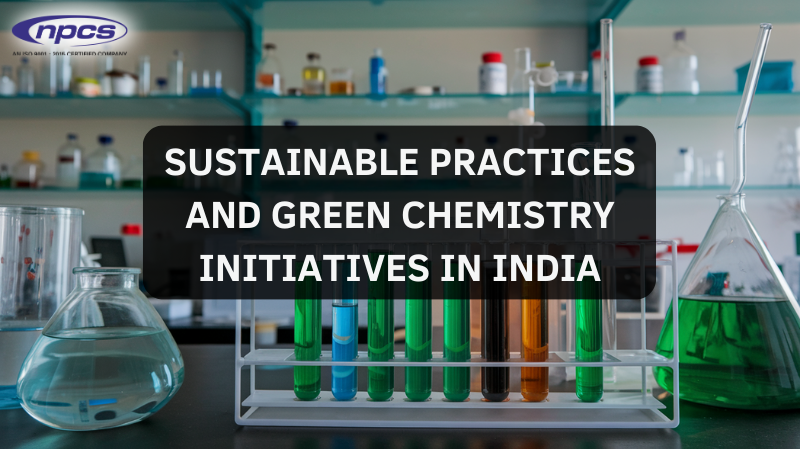The chemical and petrochemical sectors, among the key industries in the Indian economy, currently are in the phase of the great change. The sector has also changed the trajectory in view of the increasing external push for sustainability and environmental stewardship. The Department of Chemicals and Petrochemicals has presented the annual report this year, which includes a wide range of programs already in place and being put into place which are moving these and other industries towards green chemistry and more sustainable ways of making things. This transformation is much needed, considering that the said sector is an integral part of the Indian economic system and activity and has the potential to cause adverse impacts on the environment as well.
The Growing Importance of Sustainability in the Chemical Industry
The chemical sector is one of the core sectors of Indian industry and added markedly to the GDP of the country. Chemicals are used in varying compositions in a range of products, from petrochemicals and fertilizers to pharmaceuticals and dyestuffs. On the other hand, negative externalities resulting from the manufacture of chemicals, including but not limited to pollution, waste and depletion of raw materials, cannot be overlooked.
Eco-friendly measures within the industry do not just constitute a fashionable trend but rather a requirement for the attainment of ecological harmony within the period in question. Increasingly, the notion of sustainable development has captured the imagination of all the stakeholders within the industry including government, business and academia, and efforts have been focused on the implementation of sustainable practices.
Join With Us
Centers of Excellence Promoting Sustainable Innovation
A major initiative that has been undertaken in the recent past as part of the strategy for sustainable development is the creation across India of Centres of Excellence (CoE) for polymer technology. These CoEs, established along with leading institutions, are focused on enhancing the scope of applied research in eco-friendly polymers and green manufacturing processes. They are instrumental in ensuring that the output of research carried out in laboratories is put into use by industries, that is, bridging the research and the end user.
Below are some of the prominent Centers of Excellence:
- The National Chemical Laboratory (NCL) in Pune, which is working on innovative and research oriented projects targeting solutions in the sustainable polymer industry. The NCL is at the forefront of advancing new polymer technologies which include environmentally friendly end products and higher performance end products.
- Indian Institute of Technology (IIT) Guwahati, which has set up a Centre of Excellence for sustainable polymers. Institute is working on biodegradable polymers and other green materials, revising the limits of polymer science.
- CIPET (Central Institute of Petrochemicals Engineering & Technology) Chennai, which is associated with the Green Transport Network (GREET) project. It aims at using effective materials for the transportation systems, such as electric vehicles, energy efficient transport systems, etc.
- CIPET Bhubaneswar, where the bio-engineered sustainable polymeric systems are in development. The study carried out here is mainly on bio and bio soluble polymers, which help tackle one of the biggest issues in the world today, the plastic menace, and improving the environmental sustainability quotient of the chemical industry.
These centers are particularly important as they are at the forefront of promoting environmentally friendly advances in the manufacturing and utilization of plastics and polymers, which has been heavily condemned in recent years due to plastic waste.
Promoting Circular Economy through Plastic Parks
Another step towards the goal of achieving sustainability in the chemical sector is the Plastic Parks Scheme. This requires a cluster development model to augment and merge the plastic processing sector in India. The scheme enhances the productivity of the plastic manufacturing process with the support of modern equipment. The common facilities without compromising on more eco-friendly methods of doing business.
One of the objectives of the Plastic Parks scheme is to impose limits on usage of plastics and encourage their recycling by promoting a circular economy. The linear model is focused on use and disposal of single-use plastics, which creates various forms of pollution. This is especially important in the context of the increasing menace of plastic waste in the country, India. Also, the parks are encouraging the progressive Recycling technology in recycling that is effective and eco-friendly unlike the old methods of recycling.
Watch Video: Opportunities in Industrial Biotechnology.
The Petrochemical Sector’s Shift Towards Sustainability
The petrochemical industry, of which the chemical industry is a part. It has also made some advances towards integrating sustainable practices into its operations.
The Department of Chemicals and Petrochemicals has worked out a plan for the year 2024. It majorly aims to turn India into a leading hub of chemical and petrochemical products bearing low environmental sustainability.
This vision also comprises of the following targets:
- Less reliant on imports: Increase in the domestic production by encouraging their sustainability. It aims at less use of such imported petrochemical articles in India.
- The rest of the qualitative features: enticing investors for manufacturing good quality products. It is expensive to be green, yet it is possible to.
- It is encouraging that the industry can make responsible use of green technologies and encourage more funding to the sectors and be competitive.
- Applying state-of-the-art green technological advancements. Resources to consider have shown that the petrochemical industry has been investing more in technologies that cut emissions, generate less waste, and maximize energy use. These improvements are essential for making more eco-friendly the processes of manufacturing petrochemicals.
Research Initiatives and Awards for Green Chemistry
In order to foster greater innovation towards sustainable development, the Department of Chemicals and Petrochemicals. It has instituted a Decoration Scheme for Research and Innovation in Petrochemicals. This scheme caters to and encourages exceptional inventions targeted at including but not limited to, sustainable polymers, green manufacturing, and eco-friendly processing of chemicals. The objective is to reward researchers and organizations that work on sustainability so that green development is not stunted.
The commendation scheme also helps highlight the relevance of green chemistry in the chemical sector. Successful projects and initiatives of the scheme serve to encourage other companies. The research institutions to implement such practices in a similar way.
International Commitments: India’s Role in Global Environmental Protection
The focus of India’s chemical industry is not limited to the environmental challenges present in the country. but also addresses global environmental challenges. For instance, the country has been involved and signed on with international agreements such as the Stockholm Convention on Persistent Organic Pollutants. This treaty demonstrates India’s commitment to eliminating the use of dangerous chemicals and implementing safe alternatives.
By degrading the environmental quality by implementing a ban on the production and usage of POPT . The extremely hazardous chemical that is always present in ecosystems and affects people and animals’ health. India is assisting in the promotion of the health of the planet and all living organisms. Similarly, this nation makes efforts for the realization of other global treaties. It tackle the issue of persistent toxic substances and aim to replace them with safer, non-toxic ones.
Visit this Page for More Information: Start a Business in Biotechnology Sector
Challenges and Future Outlook
Although steps have been taken to remedy the situation, it is still a work in progress to make the chemical sector in India entirely sustainable. Some of the most critical challenges are the following:
- The high price of sustainable technology: A lot of green technology is yet to be developed that is relatively cheap. This is more so for small and medium enterprises (SMEs) that are the majority in the chemical sector of India.
- Lack of awareness and Technical Knowhow: More so than large corporations, smaller firms usually do not have the appropriate resources. It implement sustainable practices but this is not the problem for bigger firms.
- Government policies: Even if the authorities have established some mechanisms to promote sustainable development, there are still excessive. The unfriendly regimes that inhibit businesses from engaging in environmentally sustainable practices.
In spite of these challenges, the outlook for the future is bright. Thanks to the government of India’s support, synergies between industries, and targeted efforts. The chemical sector in India is all set to take up green chemistry and sustainable manufacturing on a global scale. The results are already being seen in the mechanisms of the CoEs. The Plastic Parks scheme, as well as in the petrochemical segment, and more will be invented as time goes by.
Conclusion
The Indian chemical industry is leading a green revolution in the world with great progress on the path of sustainability. Through initiatives such as Centres of Excellence, Plastic Parks, and overseas partnerships. India is striving towards a more sustainable and environmentally conscious future. Nonetheless, there are still issues with cost, knowledge, and policy. Given the appropriate backing and sustained creativity, the sector stands a good chance of meeting its sustainability objectives. It claiming itself as an international center for green chemicals manufacturing. With India advancing in its pursuit of balanced development, the change in the chemical industries. It will be a significant factor in achieving an environmentally sustainable and economically growing India.






